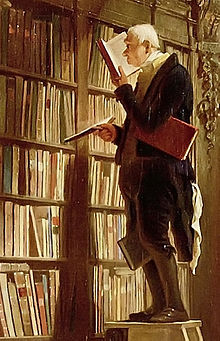Bookworm (insect)
Bookworm is a term for any kind of insect which supposedly chews through books.




This behaviour is uncommon. Both the larvae of the deathwatch beatle (Xestobium rufovillosum) and the common furniture beetle (Anobium punctatum) will go through wood and if paper is nearby they will pass into that.
A major book-feeding insect is the booklouse (or book louse). It is a tiny (under 1 mm), soft-bodied wingless psocoptera (usually Trogium pulsatorium). The insect actually eats molds and other plants found in books that were not kept clean and safe, but they will also attack bindings and other parts. It is also not a true louse.
Many other insects, like the silverfish (Lepisma saccharina) or cockroach (various Blattodea), will eat these molds, including rotten paper or the starch-based binding pastes – warmth and moisture or high humidity are needed, so damage is more common in the tropics. Modern glues and paper are less attractive to insects.
By the twentieth century, modern bookbinding materials prevented much of the damage done to books by book-boring insects.[1]
Related pages
change- ↑ Murray, Stuart (2009). The Library: An Illustrated History. New York, NY: Skyhorse Publishing. p. 198.